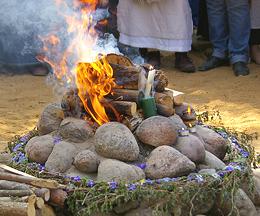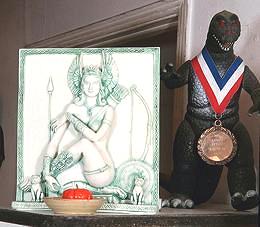
Paganism, a Presentation
First I would like to thank the Unitarian Universalist organizations
for being very Pagan friendly. Many UU churches host a chapter of the
Covenant of Unitarian Universalist Pagans.
This will be just a very light overview of an extremely complex subject.
Most important to know: Viewed widely, Paganism can in no way be
considered an "Organized Religion". In fact it can't really be considered a
religion at all. It is a World View - but it does contain religions,
some of which try to be organized.
This World View unites the diverse Pagan realm. We are entities
of this World, and by World we mean the entire Cosmos.
We are not Masters of this World, nor are we slaves - we are
participants, not the highest nor the lowest. It is our responsibility to
be stewards of our World, as best we can. This World View is a
philosophy of responsibility. You are fully responsible for your actions
and attitudes. It offers no forgiveness, by belief or otherwise. You screw
it up, you fix it, or risk the consequences. Will there be retribution after
death? We can't be certain, but best to avoid it.
Within this world view, Paganism encompasses Atheists, Non-theist
Pagans, Animists, Monotheists, Polytheists and Serial Monotheists. The
definition includes Witches, whether they like it or not. No true Pagan,
of any path, will hold that another path is wrong, unless it is doing
serious harm.
Witches are by far the fastest growing element of Paganism. Many,
including some of the most important influencers, are refugees from the
Evangelical Churches. So are many other Pagans.
Non-theist Pagans are also well represented. I strongly recommend
the book Godless Paganism, and I'm donating a copy to the Church. It
is a collection of short pieces by a number of Non-theist Pagans - and that
content is largely valid for all Pagans, regardless of path.
Most Pagan paths include a good dash of Animism, humanity's
original religion. Animism holds that every entity, animal, plant, or mineral,
has consciousness appropriate to it's place, and that larger consciousnesses
are composed of the lesser consciousnesses they are built from. This is like
the human body, a community of zillions of separate beings with differing
degrees of independence. Even individual human cells are communities,
containing essential entities with non-human DNA.
Pagans are very accepting of Science, while recognizing that Science
has limits, not recognized by all scientists. Scientists have avoided
consciousness entirely, because they can't define it or measure it. If they
thought of it at all they presumed conscousness the result of complexity.
That is breaking down, and there is now thought that perhaps it is
consciousness that constructs complexity. Of course, our favorite science
is Quantum Physics. As the saying goes, "If you think you understand
Quantum Mechanics, you are wrong."
Pagan religions are considered by far the most accepting of Alphabet
People (that's LGBTQIA+ now). A fun one is the Radical Fairies, now an
international group considered to be within the Neo-Pagan sphere.
Predominantly Queer, they adhere to Pagan inclusiveness by accepting
straight men and even women as members.
Satanism, a bastard child of Christianity, is usually not considered
Paganism. Of course the Satanic Temple is not included in this judgement.
It is simply an organization fighting for freedom from religious tyranny,
so acceptable to Pagans.
Pagans are predominantly liberal, but Pagans are people, so it isn't
all bright light and warm fuzzys. There are some restrictive groups. At the
harmless end is Dianic Wicca. To be a member you must be cis female, and are
expected to be Lesbian.
Some of the nationalistic Pagan Reconstruction movements still
try for ethnic purity. This is fading fast because in this age of rapid
transportation, migration, and mixed marriages it's increasingly difficult
to find pure anything.
More troubling is Heathenism, Germanic Paganism. Most true Heathens
are open and accepting - but it has attracted some who are not so accepting.
They conflate Heathenism with Nazism and use it to justify racism on cultural
grounds. The form adopted by White Supremacists, particularly those in our
prison systems, is extremely racist, repressive, and violent.
Now we hope those reconstructing Mexican and Central American
religions do not intend to reinstate mass human sacrifice. It was thought
necessary to preserve the World. It's been 500 years since the last one,
not counting wars, and the World is still here, more or less.
The Altar
The Altar separates Pagans from "Spiritual but not Religious".
Pagans of nearly all stripes have a personal Altar. It can be
extremely simple, just an object on a shelf most visitors would never
suspect is an altar, but it must be meaningful to the person.
The altar should be the focus of a daily ritual, a confirmation of
self. That ritual may be very simple, a few words, or it can be elaborate,
or it can be simple most days and elaborate on special days. It can be a tribute
to a Deity, a respect to Nature, or a self confirmation. The key is, it
should be daily, meaningful, and usually private.
The altar should have some space for offerings, to Deities, to
Nature, or to Ancestors, or whatever have you. It need not be large or
complex, like the working altar of a Witch, Some are, and also, some Pagans
do a bit of witchy magic work on the side.
The altar of a Theist Pagan usually contains a statuette or
other representation of one or more Gods or Goddesses. This is not for
"worshiping idols" but simply to help focus devotion. Devotions are actually
worthwhile even if you're not certain the Deities are real. Devotion to a
Deity acts to strengthen the virtues ascribed to that Deity within yourself.
Do deities actually have something like a physical form? Probably
not, and if they do, it certainly wouldn't be a human form. We don't really
know quite what they are, but they are reputed to be virtuous and
consistent.
The Altar of a Non-Theist Pagan is more likely to present
objects from nature that are meaningful to that person.
The Otherworld and After Death
The Otherworld is, for Theist Pagans, the realm of the Gods and
Goddesses, as well as many other beings and spirits, helpful or dangerous.
It may be a place humans pass through after death. Some Pagans report having
direct communion with one or more Deities, and even having some direct
experience with the Otherworld. They report the Deities are not much
forthcoming with details of themselves or their reasons for medalling in
this world, and prefer that we stay here.
Non-Theist Pagans may or may not recognize the concept of an Otherworld.
Life after Death is a concept most Pagans expect in some form
or another, because not believing in it has no upside. Many, but not all
Pagans believe in reincarnation. Evidence for how this all works cannot
be tested scientifically. Pagans do not claim to "know" things that cannot
be known. What you know is up to personal experience. Pagans are free to
modify their beliefs based on evidence.
Hell is not a concept accepted by Pagans. That you may be subject
to some justice or retribution for how you lived is common, but exactly how
it all works, well, there are various theories. We can't know the unknowable,
so we must make our best estimate based on what evidence we find and live
with it. Best to live honorably, just in case.
Jesus
Today, some people leaving Christianity, wish to bring Jesus into
the Pagan fold, and wonder if that is possible. I offer the words of a
former Jesuit who studied these matters intensively.
Quotation"The real question is not 'Can one be a Pagan and revere
Jesus?', but rather 'Can one follow the teachings of Jesus and also be a
Christian?'".
He continues "In my understanding of Paganism, one can be Pagan
and follow the teachings of Jesus, but the teachings of Christianity
are not compatible with the teachings of Jesus".
These words are far more relevant in these days of Christian Nationalism
than when written. Christian Nationalists have discarded the teaching of
Jesus entirely.
Religions Within Paganism
I don't have time for a review of all the Neo-Pagan religions in the
Western world. They are many, and growing.
- In North America, it's Wicca, Eclectic Paganism, Druidism.
- In the British Isles, it's Celtic Paganism, Wicca, and Druidism.
- In Iceland, Ásatrú a form of Heathenism, is the
second largest religion, and they're upset at how Ásatrú
is distorted elsewhere.
- In Italy, to distress of the Pope, Greco-Roman Paganism is
now a government recognized religion with appropriate priveliges.
- In Lithuania, the last European country to be Christianized,
there are a couple of Pagan religious entities vying for official
government recognition. The Catholic Church is fighting it, and the
World Court has sided with the Pagans.
- In Armenia, The first country to be Christianized, there is a
complete Pagan temple reconstructed from the original materials. The
Pagan community there loves to hold rituals on the front steps, and
costumed dances in the courtyard.
- In Russia a strong Pagan community arose while the Soviets
suppressed the Russian Orthodox Church. Today the Orthodox Church is a
wholly owned subsidiary of Putin.
- Ossetia, bordering Georgia, has never been Christianized or
Islamized, and a third of the population adheres to an unbroken Pagan
tradition.
Conclusion
So, how many Pagans are there in the United States anyway? This
cannot be known for certain, because more than half the Pagans here are
solo practitioners and do not belong to any organization that keeps count.
Nonetheless, Pew Research in 2021 estimated about 0.3% of the population, or
a little over one million.
There can be questions now, or during the social time.
Thank You
Disclaimer
- (not part of the program)
 I am a largely Non-theist Pagan, but have recently invited several Goddesses
into my household: Hekate, Aset and Nebet-het (Isis and Nepthys in Greek),
and Freya. The photo is of Freya, who seems to be branching out from her
Scandinavian roots - note her very India style pose and Japanese companion
(Shinto I presume). It's all good, since Vedic Hinduism originated from
the same Proto Indo-European root as Scandinavian Paganism.
I am a largely Non-theist Pagan, but have recently invited several Goddesses
into my household: Hekate, Aset and Nebet-het (Isis and Nepthys in Greek),
and Freya. The photo is of Freya, who seems to be branching out from her
Scandinavian roots - note her very India style pose and Japanese companion
(Shinto I presume). It's all good, since Vedic Hinduism originated from
the same Proto Indo-European root as Scandinavian Paganism.
Andrew Grygus
Pagan02 241209
- www.clovegarden.com/pagan/
©Andrew Grygus - agryg@clovegarden.com
 I am a largely Non-theist Pagan, but have recently invited several Goddesses
into my household: Hekate, Aset and Nebet-het (Isis and Nepthys in Greek),
and Freya. The photo is of Freya, who seems to be branching out from her
Scandinavian roots - note her very India style pose and Japanese companion
(Shinto I presume). It's all good, since Vedic Hinduism originated from
the same Proto Indo-European root as Scandinavian Paganism.
I am a largely Non-theist Pagan, but have recently invited several Goddesses
into my household: Hekate, Aset and Nebet-het (Isis and Nepthys in Greek),
and Freya. The photo is of Freya, who seems to be branching out from her
Scandinavian roots - note her very India style pose and Japanese companion
(Shinto I presume). It's all good, since Vedic Hinduism originated from
the same Proto Indo-European root as Scandinavian Paganism.